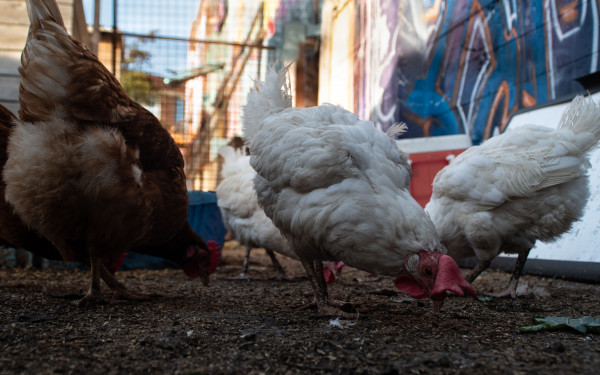A culinary homecoming
Perogie Lili offers more than food—it’s a tribute to Ukrainian heritage and family tradition
In the 1950s, in an apartment on Waverly St. in Montreal, Lili Lewyckyj, a Ukrainian mother, prepared meals for her four boys. Her goal was to offer them a taste of their distant home and culture.
Little did Lili know, she was leaving a deep and lasting impact on her youngest son, Nestor Lewyckyj. Her tradition of preparing classic Ukrainian meals would shape the Mile End neighbourhood long after her passing. This inspiration culminated in Perogie Lili, a new restaurant dedicated to sharing Ukrainian dumplings, known as ‘varenyky’ in Ukrainian, or more commonly, perogies.
Lewyckyj had long dreamed of opening a restaurant that would present Ukrainian cuisine in a fresh way to Montreal. It was only after seven years of planning and the onset of war in Ukraine in 2022 that his dream truly began to take shape.
Alongside his business partner Gregory Bedek, who previously organized the last nine years of the Montreal Ukrainian Festival, Lewyckyj meticulously brought every detail of the restaurant to life, from the food and decor to the location itself—just a block down from where he grew up.
“I wanted it to look like some Ukrainian grandmother's kitchen,” Lewyckyj said. “We want to give people that vibe, that they're coming back to something wholesome, something real.”
Perogie Lili opened its doors in August 2024, revealing a restaurant with multiple layers of significance.
At its heart, the restaurant serves as a tribute to Lewyckyj’s mother, after whom it is named.
Lili was part of a wave of immigrants who fled Ukraine during the Second World War. She spent five years in a displacement camp in Germany, with immigration proving to be no easy feat. When the war ended, many like her were reluctant to return, fearful of what awaited them under Soviet occupation. With no place to truly call home, Lili boarded a ship to Halifax in December 1950, then took a train to Montreal, where she settled at just 19 years old.
Lili passed away in 2022.
Honouring the culture Lili passed down to her family, Perogie Lili serves recipes that taste as authentic as they are familiar to those of Ukrainian descent.
The cosy diner also highlights Ukrainian artistry, from the music playing in the background to its striking murals. The current art features work by Kur & Kul Arts, a Ukrainian couple known for their vibrant representations of Ukrainian culture. At Perogie Lili, they've created a mural that spans the seasons, blending traditional Ukrainian symbols like Easter eggs and carolling with Quebec icons such as apple trees in fall. The mural even includes a nod to Lewyckyj’s dog.
Lewyckyj plans to refresh the mural every six months to keep the restaurant dynamic and engaging; this is just one of the ways he aims to create a constant flow of change at Perogie Lili.
Another way is through the menu. While offering traditional Ukrainian flavours, he also plans to introduce new varieties of perogies regularly.
“My pinnacle would be to make a foie gras perogie,” Lewyckyj said with a laugh.
The restaurant is also actively involved in humanitarian aid efforts related to the war in Ukraine, with 2 per cent of their sales going to the Canada-Ukraine Foundation.
“The whole point is to create something real and also to advertise to people that Ukrainians are here. We're part of the community,” Lewyckyj said. “The war is still going on and the genocidal invasion by Russia is still real; there's still people dying.”
Lewyckyj notices that many young Ukrainians have embraced the restaurant as a meeting spot, and he already sees groups coming in to find a sense of community. Among the six employees are three Ukrainian refugees who have found their place at Perogie Lili.
Anna Semenova Kozak arrived in Montreal in 2022 as a refugee. She initially struggled to find employment in Quebec due to the language barrier. She spent her first year focusing on French language classes before finally coming across Perogie Lili.
“It helps me to connect to my own culture and also to discover more people,” Kozak said. “We have here a very vibrant mix of Canadians, immigrants [and] Ukrainians, so it's just delightful.”
The restaurant is the first of its kind in Montreal. Customers have flocked to the restaurant, drawn by curiosity and radio buzz. Some even make the journey from as far as the West Island just to experience the Ukrainian dish.
For Helen Mourikis, a regular customer, Perogie Lili has become a weekly Saturday tradition. She was there on their Aug. 23 opening day and keeps returning.
“I look forward to it,” she said, noting that she often thinks about the food in the days leading up to Saturday.
“The best reaction that we have, which happens multiple times per shift, is people will come and they’ll get one option—maybe potatoes because that feels safe and familiar. And then they’ll eat it and be like ‘That was so good,’ and they’ll get another one or try something else,” said Hannah Kirijian, one of the Montreal workers. “I find [this] shows just how good the food is, that people are coming back in an hour to get more.”
Lewyckyj explains that, for many, the taste of perogies evokes their own pasts. It transcends time and space, transporting people back to their childhood homes or homeland with a simple taste of soft dough and potato filling.

Perogie Lili’s logo features a woman holding a perogie close to her chest with a warm, inviting expression.
“Ukrainian culture in general has a very positive, warm kind of feeling,” Lewyckyj said. “Like our logo, it's a maternal kind of soft, something you would have at home.”
Lewyckyj is always deeply touched when clients tell him his perogies are as good as the ones their grandmothers or mothers make.
“I always say, you could not pay me a better compliment,” he said.
Amid the bustle of Fairmount Ave., Perogie Lili begins its story, grounded in a history far richer than its new look suggests. As Lewyckyj reflects on his mother’s legacy, he simply says, “I’d hope she’d be proud.”
With each perogie served, the restaurant not only honours Lili’s memory, but also continues a timeless tradition, bringing a piece of the past to the present with every taste.
This article originally appeared in Volume 45, Issue 2, published September 17, 2024.





_600_375_90_s_c1.jpg)

